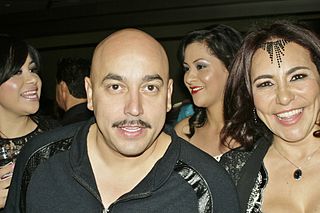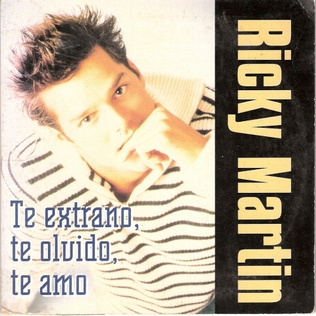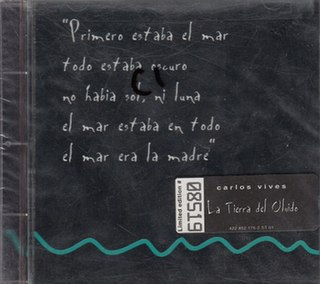
Guadalupe Rivera Saavedra is a Mexican-American singer and songwriter. In 2010, Rivera was awarded a Grammy Award for his album, Tu Esclavo y Amo. His older sister was the late singer and actress Jenni Rivera. In 2019, he was one of the coaches for the first season of the Mexican singing competition show, La Voz on TV Azteca after being acquired from Televisa after 7 season.

Marco Antonio Solís Sosa is a Mexican musician, singer-songwriter, and record producer. Born and raised in Ario de Rosales, Michoacán, Solís began his musical career at the age of six, performing with his brother Joel Solís as Los Hermanitos Solís. In 1975, he co-founded Los Bukis, of which he was the lead vocalist, songwriter and guitarist. The band split up after nearly two decades of success, with Solís pursuing a solo career. Solís released his debut solo album, En Pleno Vuelo, in 1996 by Fonovisa Records.

Félix Danilo Gómez Bosquez, known by his stage names Flex and Nigga, is a Panamanian reggaeton singer and songwriter. He adopted the name Nigga after being told by another Panamanian artist that he "sings like a black guy from Jamaica." Before releasing an album in the United States in 2008, Flex removed references to his nickname in songs, and his CD packages were reprinted with the name "Flex."

"El Amor" is a song by Puerto Rican singer Tito El Bambino. It was composed by Tito and Joan Ortiz and released on February 9, 2009, as the second single from his third studio album, El Patrón (2009). The song blends the sounds of Latin pop with cumbia and merengue. A regional Mexican and a salsa version were recorded and included on the special edition of the album.

Hernán Enrique Jiménez Pino, is a Panamanian singer better known by his stage name Makano. At the age of 12, Jiménez was part of a reggaeton group called "Los Makanos". The members of the group made a promise that the first of them to record a full album would carry on the group's name. Makano in Colombia means "strong like a tree".

"Te Amo" is a song written and performed by Panamanian reggaetón singer-songwriter Makano. It was released as the second single from his first international release of the same title. This single peaked at number-one in the Billboard Hot Latin Tracks chart.
"Y Ahora Te Vas" is a song written and produced by Mexican singer and songwriter, Marco Antonio Solís. It was performed by him as the lead singer of Los Bukis. It was released as the second single from his 11th Grammy nominated studio album Si Me Recuerdas (1988). This song became their first #1 single on the Billboard Hot Latin Tracks chart.
Premio Lo Nuestro 2010 was held on Thursday February 18, 2010 at the American Airlines Arena in Miami, FL was broadcast live on the Univision Network. The nominees were announced in December 2009 during a live televised morning show Despierta América! on Univision Network. This year marked the first time the awards are presented in High Definition.
"Hasta Que Te Conocí" is a song by Mexican singer-songwriter Juan Gabriel. It was released in 1986 as the third single from his studio album Pensamientos. Written and produced by Gabriel, the song's lyrics focus on a protagonist learning the meaning of suffering after meeting a lover who mistreats him. It peaked at number two on the Billboard Hot Latin Song chart. A live version of the song was included on his album En el Palacio de Bellas Artes (1990) which peaked at number ten on the Hot Latin Songs chart.

"Y Todo Queda en Nada" is a ballad performed by the Puerto Rican-American recording artist Ricky Martin, taken from his seventh studio album and fifth made in Spanish Almas del Silencio (2003). It was released as the album's fifth and final single by Sony Discos on December 1, 2003, in the Latin territories. The song witch written by Estéfano and co-wrriten by Julio Reyes Copello, while the production was in charge of Estéfano.

"Te Extraño, Te Olvido, Te Amo" is a song recorded by Puerto Rican singer Ricky Martin for his third studio album, A Medio Vivir (1995). The song was written by Carlos Lara, while the production was handled by K.C. Porter. It was released to radio stations and on CD by Columbia Records as the lead single from the album on September 5, 1995. A Spanish language soft ballad, it is about the singer's dream woman who has left him and as he struggles to forget her, he becomes depressed. It received widely positive reviews from music critics, who ranked it among Martin's best ballads.
The 8th Lo Nuestro Awards ceremony, presented by Univision honoring the best Latin music of 1995 and 1996 took place on May 9, 1996, at a live presentation held at the James L. Knight Center in Miami, Florida. The ceremony was broadcast in the United States and Latin America by Univision.
The 10th Lo Nuestro Awards ceremony, presented by Univision honoring the best Latin music of 1997 and 1998 took place on May 14, 1998, at a live presentation held at the James L. Knight Center in Miami, Florida. The ceremony was broadcast in the United States and Latin America by Univision.
The 14th Lo Nuestro Awards ceremony, presented by Univision and honoring the best Latin music of 2001 and 2002, took place on February 7, 2002, at a live presentation held at the James L. Knight Center in Miami, Florida. The ceremony was broadcast in the United States and Latin America by Univision.
The 1st Lo Nuestro Awards ceremony, presented by Univision honoring the best Latin music of 1988 and 1989 took place on May 31, 1989 at the Knight Center, in Miami, Florida, United States. The ceremony was broadcast in the United States and Latin America by Univision.
The Lo Nuestro Award for Pop Song of the Year is an honor presented annually by American television network Univision at the Lo Nuestro Awards. The accolade was established to recognize the most talented performers of Latin music. The nominees and winners were originally selected by a voting poll conducted among program directors of Spanish-language radio stations in the United States and also based on chart performance on Billboard Latin music charts, with the results being tabulated and certified by the accounting firm Deloitte. However, since 2004, the winners are selected through an online survey. The trophy awarded is shaped in the form of a treble clef.
The Lo Nuestro Award for Video of the Year is an honor presented annually by American television network Univision at the Lo Nuestro Awards. The accolade was established to recognize the most talented performers of Latin music. The nominees and winners were originally selected by a voting poll conducted among program directors of Spanish-language radio stations in the United States and also based on chart performance on Billboard Latin music charts, with the results being tabulated and certified by the accounting firm Deloitte. However, since 2004, the winners are selected through an online survey. The trophy awarded is shaped in the form of a treble clef.
The Lo Nuestro Award for Urban Song of the Year is an honor presented annually by American television network Univision at the Lo Nuestro Awards. The accolade was established to recognize the most talented performers of Latin music. The nominees and winners were originally selected by a voting poll conducted among program directors of Spanish-language radio stations in the United States and also based on chart performance on Billboard Latin music charts. However, since 2004, the winners are selected through an online survey. The trophy awarded is shaped in the form of a treble clef.
The Lo Nuestro Award for Urban Album of the Year is an honor presented annually by American television network Univision at the Lo Nuestro Awards. The accolade was established to recognize the most talented performers in Latin music. Originally, nominees and winners were selected through a voting poll conducted among program directors of Spanish-language radio stations in the United States, as well as based on chart performance on Billboard Latin music charts, with the results being tabulated and certified by the accounting firm Deloitte. However, since 2004, winners have been selected through an online survey. The trophy awarded is shaped in the form of a treble clef.

"La Tierra del Olvido" is a song by Colombian singer Carlos Vives from his seventh studio album of the same name (1995). The song was written by Iván Benavides and Vives, who handled production alongside Richard Blair. It was released as the lead single from the album in 1995. The song is a neo-vallenato number that utilizes the folk guitar and accordion, on which Vives longs for his homeland. The song received positive reactions from three music critics, being found as one of the album's catchiest tunes by them. It was a recipient at the ASCAP Latin Awards in 1996.









